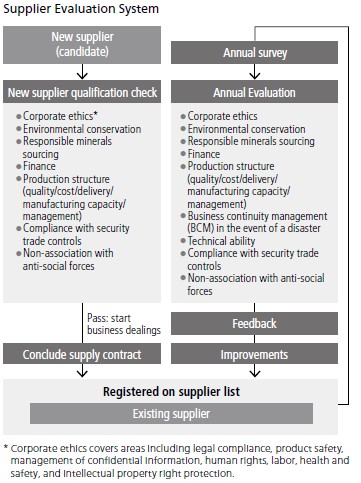Initiatives with Suppliers
| Supplier Evaluation |
| Before starting business dealings with a new supplier, Canon conducts an assessment based on the Canon Sustainability Supplier Guidelines and other reference standards of whether the company fulfills all requisite standards in terms of corporate ethics, environmental conservation (chemical substance management, prevention of air pollution and water pollution, proper disposal of waste, initiatives aimed at conserving energy and resources, reduction of GHG, and biodiversity conservation), finance, and production structure. |
| Only those suppliers who meet these criteria are accepted as suppliers. We aim to preferentially deal with suppliers evaluated highly in our comprehensive assessment including our annual supplier survey as well as each supplier’s trade performance. In addition, we conduct on-site audits of suppliers with low evaluations, providing guidance and instruction for improvement. In particular, Canon may choose to terminate business with suppliers if they are not complying with laws and social norms covering areas such as human rights, labor, and the environment. |
| For parts and materials suppliers of its main business products (“major suppliers”), Canon uses an RBAapproved SAQ to identify their labor, health and safety, environmental, and ethical risks. Our 2024 survey of 378 companies elicited responses from 372 companies (representing 98.4%). Suppliers that did not reply to the survey were followed up individually. No businesses were identified as high risk among these suppliers, but we provided feedback on the results to our major suppliers and requested that they identify weaknesses and improve on them. |
| We also conduct online meetings and arrange site visits to help verify the SAQ responses of a select number of major suppliers around the world. During on-site inspections, we check that suppliers have instituted proper policies and internal regulations relating to labor, health and safety, the environment, ethics and supplier management, and that the systems for formulating and managing annual plans for environmental performance targets are functioning effectively. Recognizing the need to reinforce systems for compliance with the RBA Code of Conduct, we also confirm that suppliers and Canon should be committed to working together to achieve continuous improvements. |
| ■ Example of Items Checked in On-site Inspection
• Availability of hotline for reporting harassment and related compliance processes • Condition of firefighting and fire protection equipment/systems and emergency exits • Regulations for using personal protective equipment and managing chemicals; implementation of OHS education activities • Records of target-setting and plans for cutting usage of energy and hazardous substances, plus related reviews • Whether code of conduct and policies are widely known |
|
We also request major suppliers to sign an agreement concerning the RBA Code of Conduct. In 2024, agreements were signed with 371 of 378 major suppliers, equating to a consent rate of 98.1%. Since 2022, at our core business production sites, we have also been carrying out risk assessments relating to labor, health and safety, the environment, and ethics, for the major onsite service providers related to security, cleaning, and cafeteria, labor agencies, and facility or dormitory management companies. The assessments conducted in 2024 identified risks mainly in the following areas, and we worked for improvement in collaboration with suppliers. ■ Charge for Expenses Incurred for Employment ■ Prohibition on Punitive Fines ■ Appropriate Pay Slips 
|
| ■ Physically Demanding Work
We requested a review of the work standards to ensure that tasks requiring the transportation of heavy objects (over 50 pounds) are carried out by two or more people. Additionally, we confirmed that pregnant women are not assigned tasks involving heavy objects. |
| ■ Management of Personal Information
With a supplier where the access to personal information about employees was not restricted properly, we requested that a framework of appropriate access controls be created. Later, we checked that a system involving password-setting had been established. |